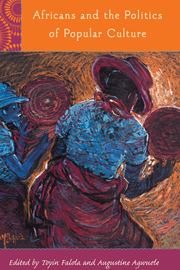Book contents
- Frontmatter
- Contents
- List of Illustrations
- Preface
- Introduction
- 1 From Primitive to Popular Culture: Why Kant Never Made It to Africa
- Part One Politics of Culture in Habitual Customs and Practices
- Part Two Politics of Culture in Popular Representations: Films and Performances
- 7 Reclaiming the Past or Assimilationist Rebellion? Transforming the Self in Contemporary American Cinema
- 8 Neither Bold nor Beautiful: Investigating the Impact of Western Soap Operas on Kenya
- 9 The Lions in the Jungle: Representations of Africa and Africans in American Cinema
- 10 Sexuality in Caribbean Performance: Homoeroticism and the African Body in Trinidad
- 11 Family Health Awareness in Popular Yorùbá Arts
- Part Three Politics of Culture in Popular Texts
- List of Contributors
- Index
- Rochester Studies in African History and the Diaspora
11 - Family Health Awareness in Popular Yorùbá Arts
from Part Two - Politics of Culture in Popular Representations: Films and Performances
Published online by Cambridge University Press: 12 September 2012
- Frontmatter
- Contents
- List of Illustrations
- Preface
- Introduction
- 1 From Primitive to Popular Culture: Why Kant Never Made It to Africa
- Part One Politics of Culture in Habitual Customs and Practices
- Part Two Politics of Culture in Popular Representations: Films and Performances
- 7 Reclaiming the Past or Assimilationist Rebellion? Transforming the Self in Contemporary American Cinema
- 8 Neither Bold nor Beautiful: Investigating the Impact of Western Soap Operas on Kenya
- 9 The Lions in the Jungle: Representations of Africa and Africans in American Cinema
- 10 Sexuality in Caribbean Performance: Homoeroticism and the African Body in Trinidad
- 11 Family Health Awareness in Popular Yorùbá Arts
- Part Three Politics of Culture in Popular Texts
- List of Contributors
- Index
- Rochester Studies in African History and the Diaspora
Summary
Introduction
Popular culture finds its expression in the mass circulation of items from seemingly diverse fields such as drama, poetry, music, and fashion. Drama and poetry have played significant roles in the presentation and representation of human experiences among the Yorùbá of southwestern Nigeria. In the traditional society, popular arts like drama and poetry are used to reveal contemporary issues. For example, during festivals and ritual performances, the alárìnjó (itinerant) theater satirizes and makes mockery of social and political ills. Through popular poetry, the itinerant theater groups are able to run commentaries against political leaders and expose their wrongs without fear of retribution. Royal poetry like yùngbà provides a way to critique monarchs without incurring their wrath. While the popular arts are still in existence, the aurality of the popular Yorùbá arts is now partially supplanted by text and audiovisual technology. These popular media have extended the reach and enhanced the effectiveness of the traditional Yorùbá arts. For instance, the traditional itinerant performers are no longer limited to live performances in village squares as they travel from one city to another. They supplement these live performances by recording their plays in studios and broadcasting them through radio, television, the cinema, home videos, and photo-play. Poetry and praise songs (orìkí) are now also relayed through these outlets as well as by compact discs, records, and printed texts.
- Type
- Chapter
- Information
- Africans and the Politics of Popular Culture , pp. 261 - 274Publisher: Boydell & BrewerPrint publication year: 2009



